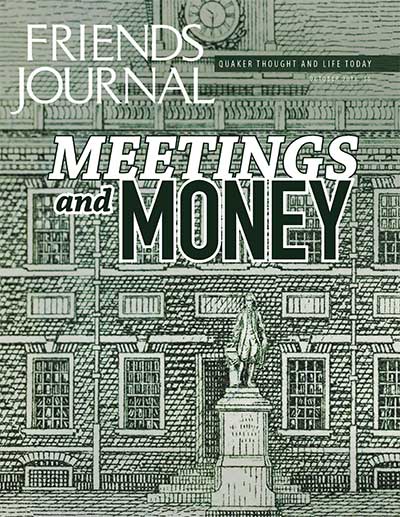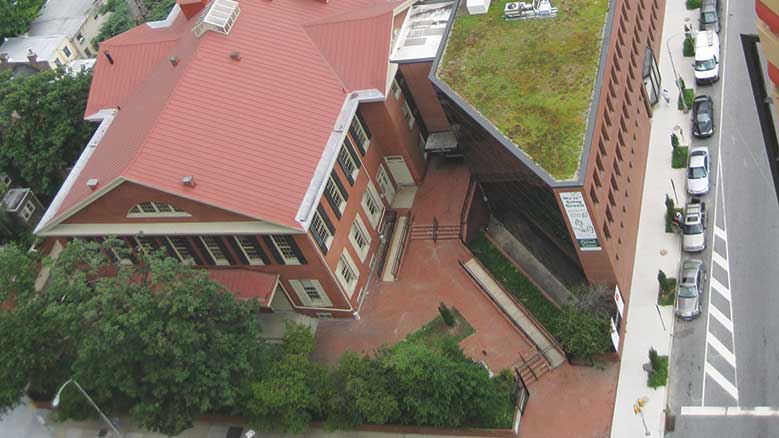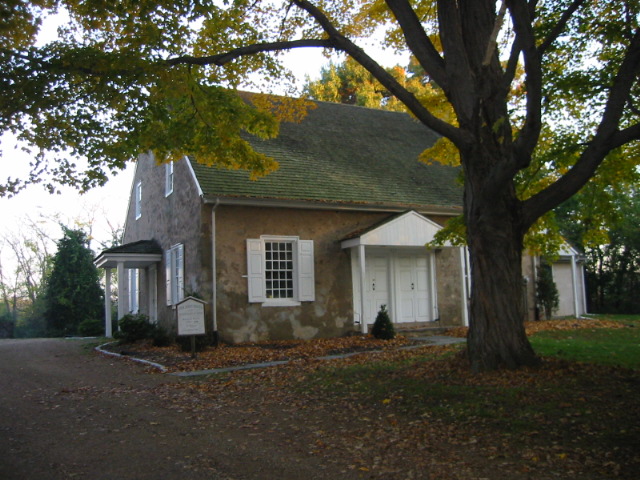
I can’t imagine that my meeting, Central Philadelphia, is alone in our flailing around in the swamp as we try to deal with issues of money.
Of course, we have our own unique situation. As a long-established meeting located in the downtown section of Philadelphia, we come with a long history and have built up an accumulation of trusts with substantial endowments. Our meetinghouse is part of Friends Center, where American Friends Service Committee (AFSC), Philadelphia Yearly Meeting, and a host of other organizations have their home. While this situation creates wonderful opportunities, it also comes with high fixed costs (no option of meeting in the local library for us!) and constrains our autonomy when making financial decisions. All of these factors tend to prevent our members from feeling power over our financial situation.
Some people might envy our problems. I remember back in the ’90s, when the stock market was booming and more interest was coming in than we needed to cover our costs, we spent a lot of time on the question of what to do with the surplus. I was impatient. I found it impossible to think of this money as our own. After all, what energy did we put out to acquire it? I thought—and said—that we should just give it away with as little time expended as possible, so we could save our discernment energy for issues that were truly about us.
There were also voices speaking on behalf of the rainy day, and on the need to be good stewards of that which is entrusted to us. We did have to make some kind of a decision about what to do. We ended up spending a fair amount of time in the swamp of indecision; the solid ground on which to make a faith-based decision was elusive. We made the best of this situation, struggling to act with integrity every year—until the Great Recession brought a whole new set of challenges starting in 2007.
The source of income that we depended on to meet high fixed costs was now significantly less. Without the capacity to nimbly retool our approach to budgeting, we ended up spending down, over the course of two years, a very generous bequest from a recently deceased and beloved member, just to pay our bills. Without other apparent short-term options, there was little dissent this time, but we shared a sense of great sorrow.
The meeting finances have recovered (as has the stock market), and we are working hard to build up our resilience. We have put increasing attention on our Every Member campaign, and have come to a shared understanding that while dead Quakers may support our infrastructure, those who are living today should be paying for the costs associated with the ongoing life of the meeting. I don’t think anybody has any illusions that we are out of that financial swamp.
Now that was a point at which we were standing on solid ground: a small hillock in a very large swamp, to be sure, but solid nonetheless.
As I reflect on how we might find our way to more solid ground, I remember the words of our dear Friend John Woolman in On Trading in Superfluities, “Dig deep. . . . Carefully cast forth the loose matter, and get down to the rock, the sure foundation, and there hearken to the Divine Voice which gives a clear and certain sound.” Where have our decisions about money rung true? Where can we tell we are standing on solid ground?
In the period after the Great Recession, when everybody’s attention was on the damage done by the big banks, the Move Your Money campaign urged us to transfer our money to more community-based financial institutions. I had already moved our family’s personal account and was among a group that asked our meeting to do the same. In response, our treasurer and secretary took it on themselves to do the considerable work (it turned out) of moving all our liquid assets to the local credit union. Now that was a point at which we were standing on solid ground: a small hillock in a very large swamp, to be sure, but solid nonetheless.
That was also the time when the potential significance of fossil fuel divestment began penetrating the awareness of socially conscious investors. With much of the endowment of Philadelphia-area Quaker meetings managed by Friends Fiduciary Corporation, a change in practice there became the focus of a group of ecojustice-minded Friends in the yearly meeting. Since Quakers have a long shared history of screening out “bads” from our investments, adding fossil fuels to that list of unacceptable investments seemed like an appropriate request.
We encouraged meetings to write to Friends Fiduciary, asking the corporation to divest. There was a good response: In 2013 Friends Fiduciary decided to exclude coal companies and related utilities from its investments, release stock in some of the fossil fuel companies with the largest reserves and the worst records for denying climate change, and offer a new alternative Green Fund.
The next step was to encourage meetings to move their assets—or at least a portion of them—into the new fund. This decision came with a cost, since the return from the Green Fund was lower than that of the general fund. It was heartening to see how many meetings, ours among them, rose to the challenge. Here was another occasion of finding solid ground: of taking action that rang true. This may be more than just an isolated hillock. With returns on renewables outpacing those on fossil fuels and many other stocks, an expectation of more movement at Friends Fiduciary seems reasonable.
This was money we had raised ourselves, in honor of both our gifts and our neighbors, and we gave it away with joy.
Our meeting found another bit of solid ground with a fundraiser this spring. Several years ago, another generous and beloved member (still very much alive) gifted the meeting with a large sum, half of which was earmarked for our neighbors in need. Our Peace and Social Concerns Committee, charged with disbursing these funds, polled members to see where they were donating and volunteering, and we chose four groups in the city where we already had some sense of connection to support over time.
Three years into this process, with the original funds beginning to dwindle, the committee decided to hold a fundraiser to replenish the account. We wanted to emphasize the joy of connection, so we billed it as a “Loving Friends Fiesta,” created a fun fair full of activities for all ages, got a gifted member to provide music for dancing, set up a five-dollar-and-under sale, and organized a silent auction. Not only did we raise more money outside of individual donations than (in my memory) we ever had, but we had a lovely time together. Particularly striking was all that we learned about each other’s gifts from the silent auction. This was money we had raised ourselves, in honor of both our gifts and our neighbors, and we gave it away with joy.
Are we so entwined with the financial markets that their good news is ours?
Despite these promising bits of solid ground, I’m pretty sure the swamp will be with us for a while. I think of our yearly meeting summer sessions in 2014. We had gone through some very lean and painful years following the recession, laying off over a third of our paid staff and slashing program expenses to the bone. After several more years of tight fiscal controls, forced savings, and austerity spending, finally, at sessions that year, we heard the good news: spending was stable; resources were up; income was showing a tendency to rise. If the stock market just continues to grow, we can anticipate more reassuring financial statements for years to come.
“If the stock market just continues to grow . . .” Are we so entwined with the financial markets that their good news is ours? Do we want to put our hopes in a system whose internal drive toward maximum interest and growth rates breeds inequality and puts ever more stress on our finite and fragile biosphere?
I think we need to put some effort into getting our minds around the nature and extent of this swamp. The messages that abound about our role in this economic system—we need more stuff; competition brings out our best; advertising increases our happiness; selfishness and greed are the building blocks of a healthy economy—surely won’t lead us to solid ground.
We may stand in opposition, but disentangling ourselves is another matter. It’s hard to have integrity in the midst of an economic system that fundamentally lacks it. While those of us who are in debt face increased indebtedness, others desperately save up in hopes that the interest will provide for our future security. Our beloved institutions depend on the health of the markets. It’s hard to imagine an alternative, yet that may be critical to finding our way forward.
It will help to listen for questions that have the ring of truth, and follow them toward solid ground. Several years ago, an African American Friend in Philadelphia asked why our yearly meeting wasn’t investing in his community. This is a question that rings true. It suggests a new possibility that goes beyond screening out what we don’t want and into investing in what actively matters to us. Of course, there are questions. What about the security of such investments? What about returns? How do we balance fiduciary responsibility with responsibility for being faithful to our beliefs? A group of Friends in our yearly meeting is currently gathering information about options and taking the pulse of the community, presenting these findings to the body.
As I reflect on the experience of our meeting and yearly meeting, our steps appear halting and our successes few. I’m sure there are other challenges ahead of us. Yet I hope that telling these stories might encourage Friends to value more fully what they have already accomplished or to try new areas that may have seemed inaccessible up till now. As we celebrate each bit of solid ground that we are able to secure and get a better understanding of the swamp that surrounds it, we’ll be better able to take up issues related to money with greater confidence, integrity, and perhaps even joy.





Thank you, Pamela, for this thoughtful article, highlighting the knotty problem of money. I’m impressed by how much your Meeting has already achieved – moving money to local unions, raising your own, etc, is a big step forward indeed. You ring many bells for me when you question the fundamentals of the money market, which functions – or so it seems to me – in a manner very opposite to all God’s ideas, as well as violating social justice and the ecology. The very idea that money can ‘grow’ without any effort on our part manages to detach us from our reality. An example being any big corporation, with profit foremost in mind, will close any production process that’s not delivering what they perceive to be the maximum possible profit, irrespective of what this closure might do to the community. The whole system has ‘injustice’ printed all over it. Most of us probably know all that, but what are the alternatives?
One might be your Friend who asked why you were not investing in his local community. If money is used up (and not just the interest thereof) in setting up systems that may create long-term healthy communities, is there not a chance that the ‘repayment’ may come back in people having jobs, rather than in monetary interest? If, say, a specific community had lost a factory (or education facilities, or libraries, or medical services, or any such thing), is there room to create one producing local goods for local consumption, which could mean jobs (as well as help the ecology), and if people have jobs, they will be able to function well and spend locally to keep the community alive? It’s the kind of thing, surely, that many communities are so desperately in need of? Would that not be a better option than relying on interest?
Doing such things is probably possible if enough start-up money and people with thoughtful talent get together to create the right thing needed in any given community. But, you will reasonably ask, what about our fixed costs to keep our Meeting House, etc, running? I am put in mind of David Wilkerson, who in the 1960s found himself called by God to the slums of NY to seek out the gangs of violent, drug-taking young people. He started with out with barely a cent, and yet it was all provided, as and how he needed it, from personal protection to money. Today it’s a huge organisation that has, and continues to, rescue many lost children. Many will have read the story in “The Cross and the Switchblade”, or its sequel “Run, Baby, run”.
Then there’s our own Peace Pilgrim, who proved that you can survive by relying daily on God’s provision, and whose words are wise. There’s the story of the young man who took God at his word – ‘I will provide for your needs’ – and stepped onto the railway platform in Plymouth, with no money at all but a great wish to be of service as a doctor to the people of Tibet. He got there, too, complete with the training and support he needed for it, lived through the invasion of Tibet and later wrote a book about it. There are thousands of stories like this, and through them we know the truth of Matthew 6, v 25-34.
Much as we love our Meeting Houses, perhaps they also allow us to keep living so comfortably in the manner we’ve become accustomed to, complete with heating/air con, good kitchens, and all the other conveniences of life that we simply accept as ‘norm’. Perhaps that very thing enables us to perpetuate the supposedly ever-greater comfort and convenience of those-who-have at the expense of those who don’t. Perhaps we can be radical and ask ourselves if our Meeting Houses can be put to better uses? Perhaps having such a project can bring us together in the living Spirit that was such a hallmark of early Friends?
It’s not easy to make such fundamental changes, particularly when they challenge the very essence of our consumer society today. Yet we know, do we not, that we must stop much of what we currently do, like flying all over the place, or driving long distances, and consider meeting at Yearly Meeting via video conferencing, rather than burdening the environment with all the emissions that our travelling to it produce. We have to start concerning ourselves with the local, with what God has put right in front of us, and without fear, for He does provide when it is done in His name. It’s so very difficult because the idea of ‘relinquishment’ goes so against the grain of today’s thinking. Yet letting go of the self-will brings such peace; letting go of our judgements reduces separateness; and the letting go of our attachments to material things brings freedom. Things like buildings in themselves are fine as long as they are truly useful and enable us to live out God’s will. Does gathering in a comfortable Meeting House enable us to do that? If it no longer does, then maybe the use the building is being put to needs to change?
These things a very challenging and difficult. But God still creates miracles, when we ask Him. George Fox had no problem with that – he even held up his hand, stomped to a pulp by angry men, and watched it heal before his eyes. Perhaps we need to reclaim our belief in His provision. Maybe that is what could free us from those wretched money worries?
Elizabeth
I’m not confident that Wind Over Coal is a sound or ethical investment strategy but, “the Love of Money is at the root of all kinds of Evil.” I like Wind, but it’s capital intensive, and requires alternative energy strategies.
Farmland should be an investment, with conversion to Organic being considered, and I’d like Montessori’s Adolescent Education to be considered, profitably. Investments should likely be obligated to their original endowment, since anyone who has a better idea, likely hasn’t.
Pamela Haines is also a co-author of the 141 page book,Toward a Right Relationship with Finance, published in 2016 by Quaker Institute for the Future. To learn more about this book and for information on purchasing go to
http://www.quakerinstitute.org/?page_id=5
Thank you for the inspiring stories, sharing light to follow to solid ground on a topic that affects us all.